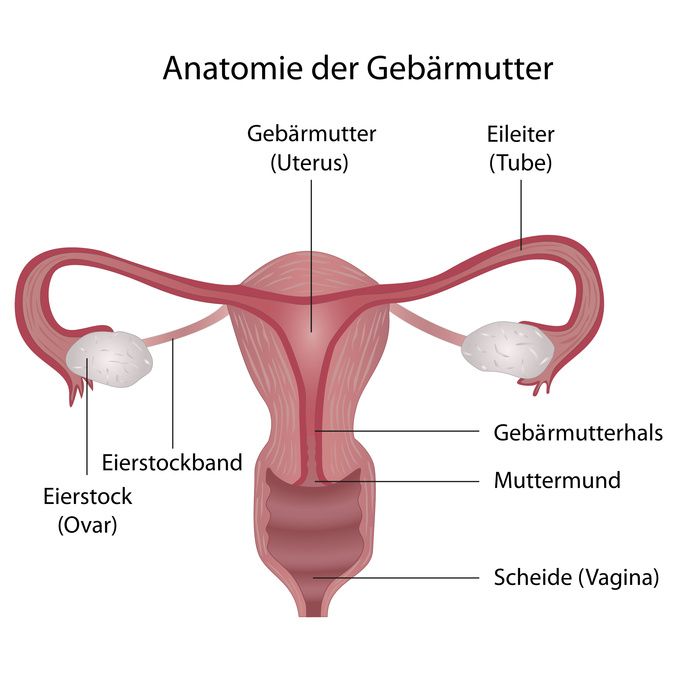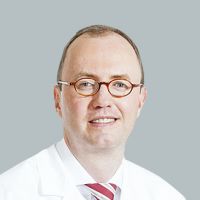Recommended specialists
Article overview
- What is PCOS?
- Causes of PCOS
- Symptoms of PCOS
- Diagnostics: When is screening for PCOS recommended?
- Research methods
- PCOS therapy
- Prognosis:
- Regular check-ups by the gynecologist are particularly important in PCOS. For example, the doctor may detect gestational diabetes and multiple pregnancies in good time and be able to act accordingly.
What is PCOS?
PCOS refers to the formation of ovarian cysts, which are water-filled vesicles (cysts) on the ovaries. They occur there arranged like a string of beads.
As a result, the hormonal balance is disturbed. This leads to the production of excessive male sex hormones, causing the typical symptoms. The male sex hormones are testosterone from the androgen group.
The disease occurs in women of childbearing age. Worldwide, the incidence in this group of people is reported to be five to twelve percent. Most often, the changes in the ovaries begin during puberty. However, symptoms often do not appear until the age of 20 to 30.
Ovarian cysts may develop during puberty and subsequently regress. They lead to a condition called temporary multicystic ovary syndrome.
The body's own hormone system is subject to a complicated regulatory circuit. Small changes lead to massive disturbances in the hormonal balance, which can upset the entire metabolism.

The anatomy of the uterus © bilderzwerg | AdobeStock
Causes of PCOS
The exact cause of the development of PCOS is not yet completely known. Since a familial accumulation of the clinical picture can be observed, experts suspect a genetic component.
Risk factors that increase the likelihood of PCOS occurring are:
- A high-fat diet,
- A high-sugar diet,
- Being overweight,
- A lack of exercise, and
- The diabetic metabolism.
A large proportion of affected women suffer from obesity. PCOS promotes insulin secretion and thus the development of insulin resistance. This in turn increases the release of male sex hormones and thus the PCOS-related symptoms.
Symptoms of PCOS
The following symptoms may occur as a result of PCOS:
- Menstrual cycle disorders,
- Infertility,
- Increasing amounts of "male-typical" body hair (hirsutism/virilization)
- Increased hair loss on the head, and
- Skin blemishes (acne).
In women with PCOS, the menstrual cycle is impaired: This can lead to
- Irregular or absent menstrual periods or
- An anovulatory cycle (cycle without ovulation).
In the latter case, the woman is infertile.
The excess of male hormones leads to an increasing "masculinization". In hirsutism, women develop hair typical of that of men, for example, that is associated with
- Beard growth,
- Chest hair,
- Prominent thigh and back hair, and
- Pubic hair extended to the navel and thighs.
Virilism includes, among others
- Deepening of the voice,
- Increasing baldness,
- Enlargement of the clitoris, and
- A decrease in breast size in some cases.
Diagnostics: When is screening for PCOS recommended?
If any of the above symptoms apply to you, do not hesitate to seek medical advice. Especially if there are known cases of PCOS in your family, you may also be affected.
It is only possible to get the hormone disorder under control through appropriate therapeutic measures. Otherwise, there is a risk of various secondary conditions and complications:
- Diabetes mellitus,
- Fatty liver disease,
- Thyroid diseases,
- Heart disease,
- Stroke,
- Sleep apnea,
- Infertility, and
- Depression.
Drug treatment is important not only for the physical but also for the mental health of affected women. In particular, patients often suffer massively from the optically visible changes.
Research methods
PCOS falls under the specialty of general gynecology. Therefore, it is recommended to see a gynecologist.
During your gynecological exam, the doctor will first take a detailed preliminary report, the medical history. This includes asking various questions about your symptoms and their development. The gynecologist will also ask you about any cases of PCOS in your circle of relatives.
The diagnosis of PCOS is subject to the three "Rotterdam criteria":
- Oligoovulation and/or anovulation (irregular cycles without ovulation),
- Virilization due to hyperandrogenism, and
- Polycystic ovaries.
Only two of the three "Rotterdam criteria" are required for the diagnosis of PCOS. This means that it is determined even without the presence of cysts in the ovaries.
The diagnosis of PCOS is currently still a diagnosis of exclusion, i.e., it is made when other diseases have been ruled out.
Symptoms such as increasingly masculine hair growth are sometimes already clear. However, the gynecologist usually performs a few more special examinations, first and foremost an ultrasound of the ovaries. Cysts on the ovaries, although common, are not always present and do not allow a "definite diagnosis" of PCOS.
In case of doubt, a blood test is also conducted. This test checks the blood sugar and blood lipid levels as well as the concentration of sex hormones. Excess testosterone or androgen is a sign that PCOS is present.
PCOS therapy
PCOS is generally not curable, but it is treatable: Medication and optimizing diet and lifestyle can significantly alleviate symptoms.
Taking a birth control pill ("the pill") has a stabilizing effect on the cycle. The pill helps with PCOS because it has an antiandrogenic effect. It therefore leads to cycle regularity and counteracts oligomenorrhea.
If you have a desire to have children, the gynecologist will prescribe medication to stimulate the ovaries instead. This causes the ovulation that had previously failed to occur. Be sure to take the medication exactly as directed. Regular ultrasound checks are also necessary. An overdose sometimes leads to water retention or a multiple pregnancy.
Depending on your individual symptoms, you will receive additional medication, such as an antidiabetic medication. This breaks the vicious circle caused by insulin resistance.
In addition to drug therapy, a weight-reducing diet is strongly recommended in the case of obesity. In general, a balanced diet and regular exercise effectively help stabilize the cycle.
In some cases, surgery is appropriate. This is done laparoscopically, i.e., via an abdominal endoscopy. During the procedure, the surgeon destroys the cysts by applying local heat.
Prognosis:
With the help of properly adjusted medication and a healthy lifestyle, affected women can lead a normal life and even become pregnant.
However, the risk of miscarriages and other pregnancy complications is higher in PCOS patients than in healthy women.










